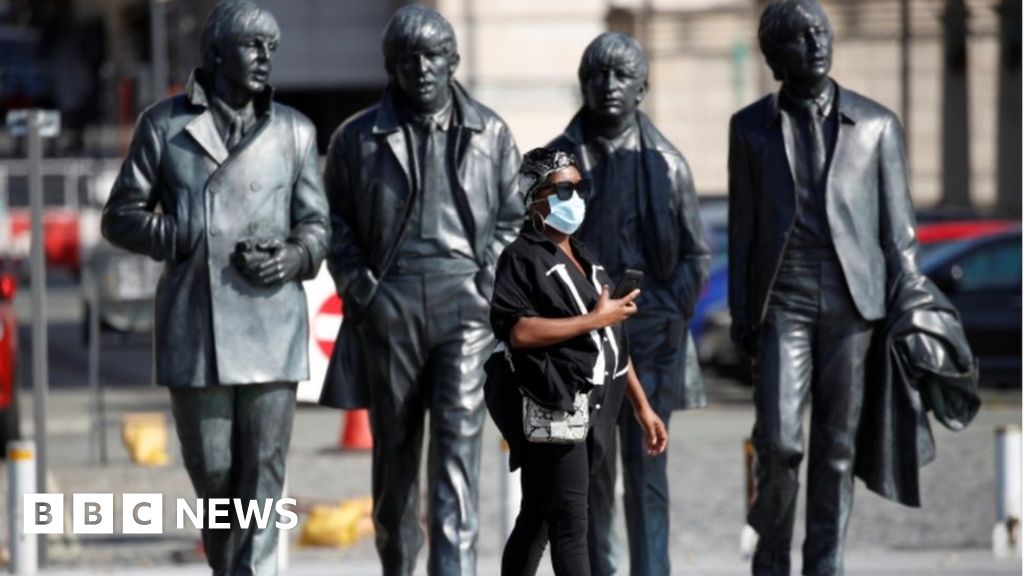
A ban on different households meeting will be introduced amid further restrictions for the north of England after a spike in coronavirus cases.
It will be illegal to meet indoors in places such as pubs and restaurants in the Liverpool City Region, Warrington, Hartlepool and Middlesbrough.
Health Secretary Matt Hancock told MPs he wanted the rules to stay in place for "as short a time as possible".
He also "recommended against all social mixing between households".
People should also:
- Not attend amateur sports events as spectators
- Only visit care homes in exceptional circumstances
- Adhere to guidance against all but essential travel, including school and work
Mr Hancock told the House of Commons: "Earlier this week we brought in further measures in the north-east, however in parts of Teesside and the north-west of England cases continue to rise fast."
Rule changes 'necessary'
He said "together we need to act" as the number of cases in Liverpool is 268 per 100,000 population.
"Working with council leaders and the mayors, I'm today extending these measures that have been in the north-east since the start of this week to the Liverpool City Region, Warrington, Hartlepool and Middlesbrough."
Mayor of Middlesbrough Andy Preston tweeted he did not accept the new rules and described them as "unacceptable" and based on "ignorance".
He said: "We tried to communicate with the government but they didn't listen.
"They're imposing restrictions that [will] kill viable jobs and damage mental health."
Restrictions on households mixing, with a ban on people meeting in homes and gardens, were brought in across Merseyside and Warrington last month.
Households were also advised not to mix in public places but that was not enforceable by law.
'Highly localised'
It will now be illegal to mix indoors anywhere but there is also a recommendation not to mix outside, in beer gardens or parks.
Hartlepool and Middlesbrough previously had no additional restrictions apart from national measures.
"I know individual rules are challenging but they are necessary and there are early signs they are working," Mr Hancock added.
Mr Hancock told MPs we must not "let up" but there was "small hope" given by a study from Imperial College which suggested the R number may be falling.
"I put it no stronger than that. Cases are still rising. However, as the chief medical officer set out yesterday this second peak is highly localised and in some parts of the country the virus is spreading fast."
Mr Hancock said £7m funding would be provided to support areas affected.
Mayor of Liverpool Joe Anderson told BBC Radio Merseyside: "It's a strange one because it seems to be a halfway house.
"The infection rate is basically out of control…the businesses, the bars, the hotels, the restaurants, those are the people that are employed by the hospitality sector. Thousands of them are going to close and potentially won't come back."
He said funding announced was a "drop in the ocean" and he was "deeply, deeply worried" about businesses.
Nick Triggle, BBC Health correspondent
One of the strange things with the first wave in the UK was that the virus seemed to seed everywhere.
In other countries, Spain and Italy for example, it was much more localised with the virus highly concentrated in a few towns and cities.
But as the second wave rolls out, a clear pattern is emerging with marked peaks in a number of north-west and north-east areas.
It was a point made at the televised briefing on Wednesday with chief medical adviser Prof Chris Whitty saying the UK may have quite a different spread this time round.
The situation could easily change. Other areas may see sharp rises in the coming weeks - although the evidence at the moment suggests a more gradual increase.
The big unknown is why this is happening. Certainly there were higher levels of infection in the north when lockdown lifted, making it easier for the virus to take off.
There are a number of other theories - from the socialising habits of young people to the high concentration of densely-populated housing.
Whatever the cause, the high rates of infection and climbing hospital admissions in these areas is the issue that is causing ministers and their officials most concern at the moment.
Leader of Knowsley Council councillor Graham Morgan tweeted he was "concerned" the further restrictions "won't be enough to stop the spread of the virus here".
"We're at a critical point and need swift, effective solutions to protect our residents."
Mr Hancock also said Bolton would be "brought in line" with the rest of Greater Manchester.
This means easing restrictions which reduced all pubs and restaurants in the town to takeaway only.
There would be no other changes to restrictions elsewhere, including West Yorkshire, Midlands, North East and other parts of Greater Manchester, he said.
Are you in one of the regions? What will stricter measures mean for you? Emailhaveyoursay@bbc.co.uk.
Or use this form to get in touch:
If you are reading this page and can't see the form you will need to visit the mobile version of the BBC website to submit your comment or send it via email to HaveYourSay@bbc.co.uk. Please include your name, age and location with any comment you send in.
https://news.google.com/__i/rss/rd/articles/CBMiLmh0dHBzOi8vd3d3LmJiYy5jby51ay9uZXdzL3VrLWVuZ2xhbmQtNTQzNzEwNzPSATJodHRwczovL3d3dy5iYmMuY28udWsvbmV3cy9hbXAvdWstZW5nbGFuZC01NDM3MTA3Mw?oc=5
2020-10-01 11:26:15Z
52781095888012
Tidak ada komentar:
Posting Komentar